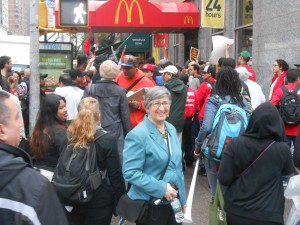Waking Up to Justice: Rabbi Ellen Lippmann on the Fast Food Workers’ Strike (In NYC, 150 cities, 30 countries)
May 15, 2014. 4:30 am.The alarm rings. Groggily, I rise and dress, and head into midtown Manhattan to meet a motley crew of clergy and fast food workers and organizers, coming together at the beginning of a day of strikes by fast food workers here – and across the country and the world. I join one rabbi, several ministers, lots of workers, flags, banners, an organizer who grew up in my congregation, and curious onlookers still half-asleep before 6 am. The streets are half-empty, unheard of in New York. Soon they are filled by wave after wave of workers, determined that today is the day McDonald’s will change its tune or the governor of New York will grant our city and others the right to set our own minimum wage.
Waking up early. It is a fine Jewish tradition since the time of Abraham, who got up early so often he became known as the originator of morning prayer. This morning we woke up to justice, hoping to awaken the city, the state, McDonald’s and all other fast food companies who continue to pay their workers a minimum wage that no one can live on in New York City or almost anywhere else.
We Jews hold as a foundational story the liberation from slavery in Egypt, which was followed by the commands to have a Sabbath – an unimaginable luxury for former slaves – and rules about how and when and how much to pay workers. The word avodah permeates since Torah and beyond, with its interwoven meanings of prayer and sacrifice and labor. Today it is my avodah – my sacred sacrifice – to lose some sleep to stand for justice, to stand for today’s downtrodden, the poor, mostly women, mostly people of color, who work for fast food companies feeding everyone else but unable to feed themselves or their families.
“But we shouldn’t eat fast food,” people sometimes say to me. That is their choice, and mine. But whether we eat it or not, many do, and those who work in those McDonalds or Wendy’s or Burger Kings should be paid more than $8.00 per hour. McDonald’s reported $6.7 billion in first-quarter revenue in 2014. Can it really not afford to pay more, say the modest $15 an hour that the workers are seeking?
Meanwhile, on the street, the band is playing, and a 19-year-old worker sings “Old McDonald had a strike, eee-iii-eee-iiii-oh.” I know that the strike kept a lot of business out of at least two McDonalds and a Wendy’s in Midtown. Will this reality, repeated across the country and the world, be enough this time? Or how many times will be back, waking up early like Abraham confronting God about the destruction of Sodom and Gomorrah?
In Deuteronomy 15 we ourselves confront a paradox: We are taught that as we create a just society, there should be no needy. A great ideal! Yet a few lines later reality hits: When there are needy, hold out your hand. Our work today, our waking up early today, starts to fill the gap. There are needy in our city. We can hold out our hand to feed or give a little cash to, or we can hold out our hands in solidarity. 100 years ago it was young Jews standing up for their rights as poor exploited workers. If we can remember Abraham we can remember our grandparents and great grandparents. This morning I looked into the eyes of today’s Rose Schneiderman, and smiled, and joined her chant.
May its tones reach the seats of power at McDonald’s, and in Albany, and rise even higher to the throne of Glory.
Rabbi Ellen Lippmann is founder and rabbi of Kolot Chayeinu/Voices of Our Lives: Building a Progressive Jewish Community in Brooklyn. In 2013, Rabbi Lippmann was named by The Jewish Forward as one of 36 of America’s Most Inspiring Rabbis Shaping 21st Century Judaism.
![[the current issue of ZEEK]](../../image/2/100/0/5/uploads/leftistethicistgraphic-52842c6a.png)
- 5000 Pages of Zeek
- Founded in 2001, Zeek was the first Jewish online magazine, and we have over 5000 pages online to prove it, all available free of charge. Read more in the Archive.
More articles by
Rabbi Ellen Lippmann
More articles in


